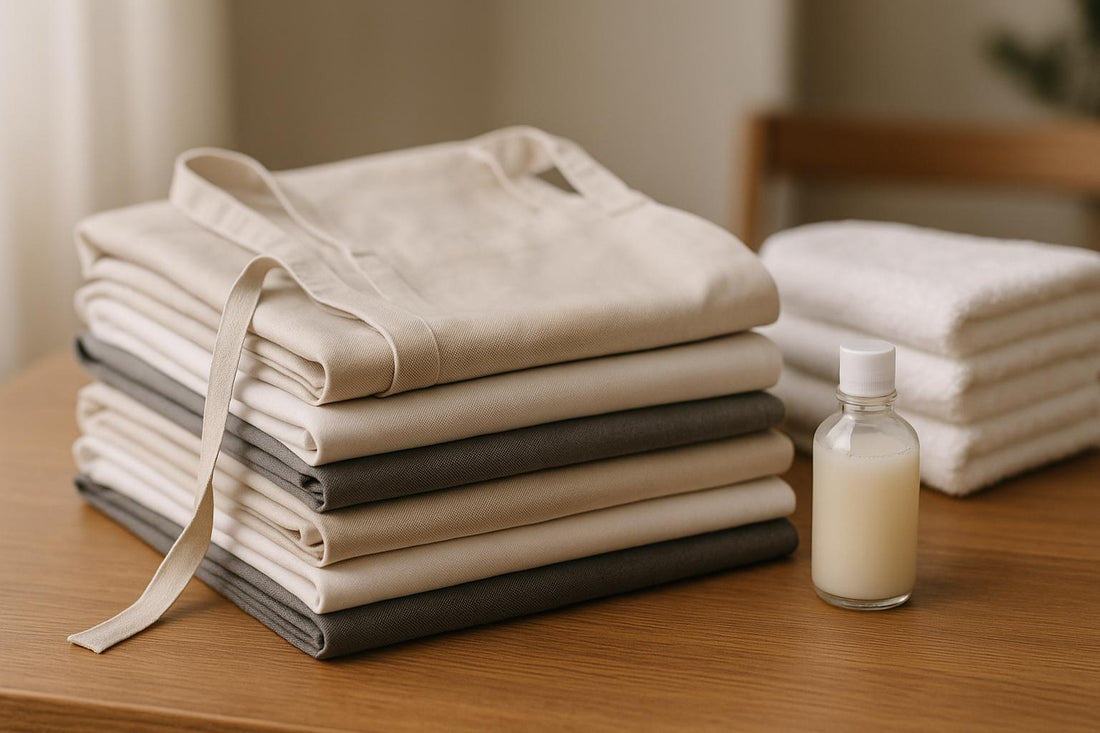
Fabric Care Tips for Bistro Aprons
Share
Bistro aprons go through a lot - stains, wear, and constant washing. Taking care of them properly ensures they last longer and look professional. Here’s a quick guide:
- Cotton: Wash in warm water, air dry or tumble dry on low to avoid shrinking.
- Polyester: Use cold or warm water, avoid high heat, and air dry or tumble dry on low.
- Linen: Gentle wash in cool water, air dry to prevent wrinkles.
- Denim: Wash inside out in cold water, skip fabric softeners, and air dry.
- Waxed Canvas: Spot clean only, avoid machine washing, and reapply wax as needed.
Storage Tips: Hang aprons to prevent creases, store in a cool, dry place, and keep them completely dry to avoid mold.
For a quick care summary, check the fabric label and follow these basic steps: pre-treat stains, wash with the right settings, and store appropriately to maintain quality.
HOW TO CLEAN A WAXED CANVAS SHOP APRON
Pre-Wash Preparation Steps
Before diving into the wash, take these steps to ensure your apron gets the care it deserves.
Reading Care Labels
Care labels are like a cheat sheet for keeping your apron in great shape. They tell you everything you need to know about washing, drying, and handling your apron. Look for symbols that indicate whether it’s safe to machine wash, hand wash, or dry clean. Pay attention to temperature icons - cold water is gentler on cotton to prevent shrinking, while warm water can be better for tackling certain stains. You’ll also find symbols for wash cycles (normal, permanent press, or delicate) and drying methods (tumble dry, hang dry, or dry flat). If your apron is made from a fabric blend, always follow the instructions for the most delicate material to avoid damage.
Sorting Aprons by Fabric and Color
Sorting your aprons properly can save you from color disasters and fabric mishaps. Separate them into piles of lights, darks, and brights to avoid dye transfer. Jennifer Parnell, co-founder of Humble Suds, emphasizes the importance of this step:
"Different fabrics and fabric blends need to be laundered appropriately to avoid discoloration, shrinking, fading, and damage to fabrics and the garment."
Keep whites and light-colored aprons away from dark or bright ones to maintain their color. For fabric blends, wash according to the dominant material unless it includes something delicate like silk or wool. In those cases, follow the care instructions for the delicate fabric. As Parnell explains:
"For mixed fabric blends, launder based on the dominant fabric blend unless it contains a delicate fabric such as silk or wool. Silk or wool should be laundered as noted on labels."
If your apron is heavily soiled, opt for a longer, heavy-duty wash cycle. To make sorting easier, consider using a partitioned laundry basket.
Pre-Treating Stains
Kitchens are a magnet for stains, but pre-treating them can make a world of difference. Grab a stain remover or detergent and apply it directly to the problem area. Here’s a quick guide for common stains:
- Grease: Use dish soap.
- Wine: Dab with white vinegar or lemon juice.
- Coffee: Mix equal parts vinegar and warm water.
- Tomato sauce: Apply white vinegar.
- Curry: Make a paste with baking soda and water.
Always blot stains gently - don’t rub, as that can make things worse. In July 2024, Ruvanti shared a detailed guide highlighting the importance of targeted stain treatment and allowing enough soaking time before washing.
Once your stains are handled, you’re ready to follow the care instructions specific to your apron’s fabric.
Fabric-Specific Care Guidelines
Taking proper care of your aprons starts with understanding the needs of each fabric. Here’s a breakdown of how to handle different materials to keep them looking and performing their best.
Cotton Aprons
Cotton aprons are tough yet prone to shrinking if not handled correctly. Wash them in warm water (up to 104°F or 40°C) with standard detergent. To minimize shrinkage, air dry or tumble dry on low heat. A regular machine cycle works just fine for most cotton aprons.
For dark-colored cotton, use cold water and a color-safe detergent to maintain their vibrant shades. Before washing, tie the apron strings into a bow to prevent tangling, and don’t forget to empty the pockets. If needed, iron on a medium heat setting.
Polyester and Polyester Blends
Polyester aprons are durable and easy to care for, making them perfect for busy environments. Wash them in warm or cold water on a gentle cycle with mild detergent, and steer clear of bleach. High heat can damage polyester, so stick to low-heat tumble drying or air drying.
For ironing, use a low-temperature setting or steam. To avoid snags and wrinkles, turn the aprons inside out and consider using a mesh laundry bag. When storing, make sure they’re clean and either folded neatly or hung up.
Linen Aprons
Linen aprons bring a natural elegance to your kitchen but require extra care. Wash them on a gentle cycle in cool to lukewarm water to preserve their soft texture. Linen wrinkles easily, so air drying is best - hang the apron on a sturdy hanger while it’s still slightly damp to reduce creases. If you opt for machine drying, use the lowest heat setting and remove the apron while damp. For ironing, a high heat setting works well, especially if the fabric is slightly damp or paired with steam.
Denim Aprons
Denim aprons are stylish and sturdy but need special attention to maintain their color and structure. Always wash denim separately in cold water, turning it inside out to protect the fabric’s color and finish. Skip fabric softeners, as they can weaken the fibers. If using a dryer, choose the lowest heat setting and remove the apron while it’s still slightly damp. Pay close attention to reinforced areas like seams and pockets to ensure they’re thoroughly cleaned. Hanging the apron to dry can help avoid permanent creases.
Waxed Canvas Aprons
Waxed canvas aprons are built for heavy-duty use, but their care requirements are unique due to the wax coating. Avoid machine washing, hot water, and traditional detergents, as these can strip the wax layer. Hudson Durable Goods advises:
"The best way to maintain your waxed apron is to avoid machine washing, hot water, and conventional soaps/detergents that will accelerate the breakdown of the infused wax."
For everyday cleaning, use a damp cloth or sponge to spot clean. For deeper cleaning, submerge the apron in lukewarm water with castile soap, then let it air dry completely. Hedley & Bennett explains, "Waxed canvas aprons are great at resisting stains and spills, but they can only be spot-cleaned."
Texas Canvas Wares adds:
"Never dry clean, machine wash or machine dry your waxed canvas - as that's the fastest way to remove your protective wax finish."
Store waxed canvas aprons in a cool, dry, and ventilated area to prevent mold. When the wax coating starts to wear off or water resistance diminishes, rewax the apron. This involves cleaning the surface, applying fabric wax sparingly, heating it with a hair dryer, and wiping off any excess.
sbb-itb-c693c43
Storage and Long-Term Maintenance
Taking care of your bistro aprons doesn’t stop after washing; proper storage plays a big role in keeping them in great shape for longer. The way you store them depends on the fabric and how long they’ll be tucked away, but a little attention here goes a long way.
Folding vs. Hanging
Hanging is almost always the better option when it comes to storing bistro aprons. Hanging prevents creases and allows air to circulate, keeping the fabric fresh. Use hooks or hangers to dry and store aprons instead of folding them.
For fabrics prone to wrinkling, hanging is a must. Polyester and denim aprons, on the other hand, are more forgiving. You can fold or hang them, but hanging still helps maintain their shape and avoids creases over time.
Seasonal Storage Tips
Adjusting your storage methods with the seasons can help keep your aprons in top condition.
- Spring: Let aprons air out in the spring sunlight to eliminate any musty odors and brighten colors. Check for stains that may have developed during winter storage and spot clean or soak as needed.
- Summer: Frequent use in summer calls for gentle washing. Line drying on sunny days not only saves energy but also takes advantage of sunlight’s natural disinfecting properties.
- Fall: Before packing away lighter summer aprons, give them a thorough cleaning. Ensure they’re completely dry and repair any small tears or replace missing ties.
- Winter: For spring and summer aprons, use breathable cotton bags for storage. Add lavender sachets or cedar blocks to keep them fresh and deter pests during the off-season.
Wherever you store your aprons, avoid direct sunlight or heat sources, as these can cause fading or discoloration over time.
Preventing Mold and Mildew
Moisture is the biggest threat to stored fabrics, especially in humid environments where mold and mildew thrive. To keep your aprons safe:
- Make sure aprons are completely clean and dry before storing.
- Maintain humidity levels below 50% using dehumidifiers or silica gel packs.
- Use breathable storage materials like cotton garment bags or acid-free boxes instead of plastic containers.
Natural solutions can also help. Cedar-lined boxes, cedar blocks, or sachets filled with lavender or dried rosemary not only deter mold and pests but also absorb moisture and leave storage areas smelling fresh.
Regular checks are key. Inspect storage areas every few months for signs of dampness or humidity issues, and address problems immediately. Occasionally air out stored aprons to prevent stagnant conditions that can encourage mold growth.
Finally, choose storage locations wisely. Cool, dry, and well-ventilated spaces are ideal - avoid basements or attics where fluctuating temperatures and humidity could damage the fabric over time.
Summary of Key Tips
Taking care of your aprons starts with understanding the fabric. Always check the care label first - this simple step helps prevent damage and ensures you're treating each material appropriately.
Before tossing aprons into the wash, make sure to empty all pockets, pre-treat any stains, and secure the strings. If you're dealing with garment-dyed aprons, wash them separately in cold water to avoid color bleeding.
Stick to cold water, mild detergents, and low heat for washing and drying. This helps maintain the fabric's quality and prevents issues like shrinkage, fading, or unnecessary wear. Avoid high heat at all costs - it can be rough on most materials. When drying, opt for low heat settings or better yet, air drying whenever possible.
Drying deserves just as much attention as washing. Hang your aprons to dry or lay them flat to avoid the damage that high dryer heat can cause. If ironing is necessary, always test the heat on a small, hidden area first and adjust the settings based on the fabric type.
| Fabric Type | Washing Method | Drying Method | Ironing Temperature |
|---|---|---|---|
| Cotton | Warm water, mild detergent, regular cycle | Low heat or air dry | Medium heat |
| Polyester | Warm water, mild detergent, gentle cycle | Low heat or air dry | Low heat |
| Denim | Cold water, mild detergent | Air dry | High heat |
| Linen | Hand wash | Lay flat to dry | Medium heat |
| Waxed Canvas | Spot clean with damp cloth | Air dry only | Do not iron |
Once clean, proper storage is just as important. Hanging aprons is usually better than folding - it prevents creases and allows for proper air circulation. Store them in a cool, dry place out of direct sunlight to avoid fading and fabric breakdown.
For long-term storage, make sure aprons are completely dry and clean beforehand. Use breathable materials instead of plastic, and keep storage areas at the right humidity to avoid mold or mildew. Regularly inspect stored aprons to catch small issues early, like tiny holes, and repair them before they get worse.
Consistency is the secret to keeping your aprons in great shape. Following these care practices regularly, rather than just occasionally, helps preserve their look and functionality for much longer. By sticking to fabric-specific care and thoughtful storage habits, your aprons will stay ready for service day after day.
Cosmic Aprons: Durable and Easy-to-Care Fabrics

Cosmic Aprons are designed to combine long-lasting quality with hassle-free maintenance. Each apron comes with clear, fabric-specific care instructions to help you avoid any accidental damage.
The thoughtful construction of these aprons prioritizes durability. Adjustable straps help prevent stretching, ensuring a snug fit, while reinforced pockets are built to handle heavy use without tearing - even when carrying multiple tools or utensils.
Fabric selection is another key strength. Cosmic Aprons use materials that balance stain resistance and durability. Polyester blends are excellent at resisting both stains and fading, while cotton options provide breathability and are easy to maintain. For those needing extra protection, canvas aprons deliver heavyweight spill resistance without compromising on washability.
Convenience is a major focus, too. All Cosmic Aprons are machine washable, so there’s no need for special treatments or professional cleaning. The fabrics are made to hold up through regular washing cycles without losing their shape, color, or protective qualities. Each apron also comes with specific guidelines for washing, drying, and ironing to make care as simple as possible. With these features, Cosmic Aprons are a reliable choice for any fast-paced kitchen.
FAQs
How do I keep my bistro aprons from shrinking in the wash?
To prevent your bistro aprons from shrinking, make sure to wash them in cold water and select a gentle cycle on your washing machine. For drying, air drying is the safest option to avoid heat exposure. If you need to use a dryer, stick to a low heat setting to reduce the risk of shrinkage.
Steer clear of bleach or harsh detergents, as they can weaken the fabric and lead to damage over time. By sticking to these straightforward tips, you can keep your aprons in great shape and maintain their size and quality for extended use.
How can I remove tough kitchen stains from bistro aprons?
Got tough stains on your bistro aprons? Here's how to handle them step by step:
- Grease stains: Start by applying a dab of dish soap directly onto the stain. Gently rub it in, rinse with warm water, and then toss the apron into the wash as usual.
- Stubborn marks: Mix equal parts white vinegar and water to create a pre-treatment solution. Apply it to the stain, let it sit for a few minutes, and then launder the apron.
If the stain still won’t budge, try a commercial stain remover specifically made for organic stains. And don’t forget to check the care label on your apron first to make sure your cleaning method is safe for the fabric.
Why should aprons be stored in a cool, dry place, and how does this help them last longer?
To keep your aprons in top shape and make them last longer, store them in a cool, dry place. Too much humidity or heat can wear down the fabric, causing problems like mold, mildew, or bad odors. These issues can not only damage the apron but also make it unsuitable for hygienic use.
It's also a good idea to keep aprons out of direct sunlight. This helps preserve their colors and keeps any embroidery from fading. With proper storage, your apron will stay fresh, sturdy, and ready to use whenever you need it.
